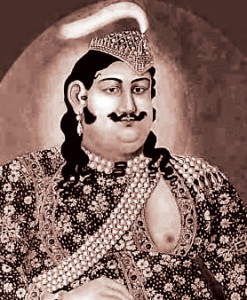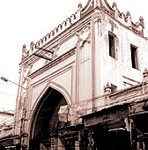| Told by |
Biswajit Bhattacharjee |
| Obtained by |
Sanjoy Bandopadhyay |
| Date |
11 December 2014 |
| Place |
Sangeet Bhavan, B.T. Road Campus, Rabindra Bharati University, 56A, B.T. Road, Kolkata 700050 |
| On Biswajit Bhattacharjee |
Faculty member of the Department of Instrumental Music, Rabindra Bharati University, Tabla player of Lucknow gharana. |
| Key-words |
1970s, Tapan Theatre, South Kolkata, Music Conference, Tarapada Chakraborty, Manas Chakraborty, Anil Bhattacharjee, Lucknow Gharana, effect of music, Shiva, Stotra, tears, vocal |
???? ???? ???? ???. ??? ??????? ??? ???. ?????? ??????? ???????? ??????? ??? ??????? ??. ????? ???? ?????? ????????? ??????. ??????????? ????? ??? ??? ??????. ??? ??? ??? ??? ?? ????? ??????-??????, ???????????? ?????? ????????? ??? ?????????. ??? ?????? ???? [???? ?????????], ?????? ?????? ???, ??????? ???? ? ????? ???????? ???? ?????. ???? ???? ?????? ???? ??????????? ????? ?????. ????? ????? ???????? ?????. ?? ???… ????… ????? ??? ????????????? ??… ???? ??? ??? ???? ????. ???? ????????????? ?? ??? ????????. ?? ?? ??? ?????? ??????? ?????, ???? ????? ?????? ? ??? ???? ??? ??? ???? ????? ??????, ????? ??????? ???? ???, ???? ?????? ???? ???? ??? ??????; ??????.. ??? ????? ?? ????? ???, ????????? ?????? ????? ????????? ?????? ?????? ???? ??? ?????? ??? ????… ?? ??????-?????? ???? ??????? ?? ??-??? ???? ????? ?? ??? ??????, ????? ???? ???????? ?? ?????? ?????? ??????? ????. ???? ?????? ??????, ???? ??? ?????, ???? ??? ?????? ???? ????. ??? ???? ???? ??? ????????? ???? ???????. ????? ?? ?-?? ???????? ????? ????? ???????; ??? ?????? ????? ???? ?????? ???? ?????????, ?? ??????? ???? ? ?????? ????? ????? ???? ???????. ?????? ?????? ???? ??, ????? ??? ??? ??? ????? ????? ?????!? ??? ????? ??? ?’?! ??? ??? ???? ?? ????? ????? ???? ?????? ??? ?????, ??????? ????? ???? ????? ??? ?????. ? ???? ??????? ????. ??? ?? ??? ??? ????, ??? ?? ?????? ??? ?????! ? ???? ??????? ?? ?? ????????? ??? ??????? ???? ?? ?????? ????? ?????????.
Paraphrased in English
Weeping Audience
Told by: Biswajit Bhattacharya
Around 1970, a musically remarkable incident happened in southern part of Kolkata. A musical concert was arranged in Tapan Theatre. It was in Bhawanipur area near Sadananda Road, Kalighat. It was a wonderful evening, and that evening gave the listeners a memorable music listening experience; the reminiscences of the melody are still echoing in the air. Sangeetacharya Tarapada Chakraborty along with his son Pandit Manas Chakraborty was rendering khyal. Pandit Manas Chakraborty was accompanying his father with tanpura and also providing vocal support. Pandit Anil Bhattacharya was on the Tabla in a very supportive mood. He was following Sangeetacharya very closely. Sangeetacharya Tarapada Chakraborty was completely engrossed in his music. After some time he started Shiva Stotra. He had such a unique and beautiful voice! As he continued with the beautiful melody, his son stopped his vocal rendering and kept aside his tanpura. Pt. Bhattacharya on tabla was spellbound. Sangeetacharya Tarapadaji was so absorbed in his creation that water started flowing through his eyes. There was deep silence all around. The audiences got memerised as they began to feel the ultimate connection with the cosmic energy. They were so captivated in the melody that they also could not restrain their emotions. Instead of the sound of clapping there were weeping and hiccups all over.
This is one of the mesmerizing incidents, which still a music lover love to cherish.
Notes:
Sangeetacharya Tarapada Chakraborty: Born on 1st April 1909 in Kotalipara, Faridpur, Bangladesh. He died on 1st September 1995. He was felicitated Sangeet Natak Akademy Fellowship from Sangeet Natak Academy in 1972. He was also conferred State Academy award from Rabindra Bharati University in 1972.
Pandit Manas Chakraborty: Born on 9th September 1942 in Kolkata. He died on 12th Deccember 2012. He was the son and disciple of Sangeetacharya Tarapada Chakraborty. He was the torchbearer of Kotali Gharana.
Award list of Pt. Manas Chakraborty:
- Heritage Samman by Heritage World Society, Tower Group (2012)
- Sangeet Samman Award, Presented by The Dover Lane Music Conference (2011)
- Dishari Award (Twice) – West Bengal Journalists’ Association
- Maharishi Award (1987) – Maharishi World Centre of Gandharva Veda at U.K. Roydon Hall
- Girija Shankar Memorial Award (1989) – Girija Shankar Smriti Parishad
- Jadubhatta Award (1995) – Salt Lake Cultural Association, Kolkata
- Outstanding Citizen Award (2000) – English Teaching Union.
- Award for his excellence at 15th Master Dinanath Mangeshkar Sangeet Sammelan – Samrat Sangeet Academy (Goa).
- Felicitated by Rotary International
- Felicitated by Dover Lane Music Conference (1992) on his 50th birth-anniversary
- Felicitated by Kotalipara Sammelani (2000)
- Felicitated by Samatat for his contribution in the field of Indian Arts and Music
- Lifetime Achievement Award from Mohanananda Brahmachari Sishu Seva Pratisthan
Pandit Anil Bhattacharya: Renowned Tabla player of Lucknow gharana of Tabla playing. He was the disciple of Wajid Hussain Khan and Chhottan Khalifa of Lucknow Gharana.
Kotali Gharana: Pandit Tarapada chakraborty was the prime architect of Kotali Gharna.
Paraphrasing and notes by Dr. Suranjita Paul, Research Fellow
Data processed at SAP-DRS Lab, Department of Instrumental Music, Rabindra Bharati University.



